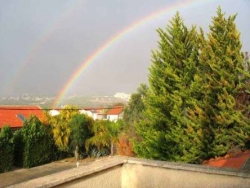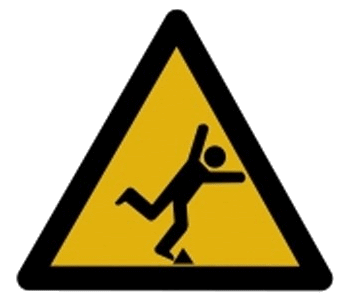
 |
| Torâh | Haphtârâh | Âmar Ribi Yᵊhoshua | Mᵊnorat ha-Maor |
|---|---|---|---|
| Setting: ca. B.C.E. 1427. Location: Area of Shit•imꞋ & Har Nᵊvo, east of NᵊharꞋ ha-Yar•deinꞋ, opposite Yᵊrikh•oꞋ (see map below: 31° 46' N, 35° 43' E). |
| ||
| |||
Pâ•suqꞋ 31.12 –
"äÇ÷ÀäÅì àÆú-äÈòÈí : the men, the women, and the tots; åÀâÅøÀêÈ who is within your gates; so that they will Shᵊm•aꞋ and so that they will learn, and they will revere é--ä your Ël•oh•imꞋ, and will keep sho•meirꞋ to do all of the matters of this úÌåÉøÈä."
Here, úÌåÉøÈä makes it explicit that äÈòÈí includes geir•imꞋ—with the proviso that they are within the gates of the Pᵊrush•imꞋ-heritage bât•eiꞋ-din of Israel that maintain the standard of logical Ha•lâkh•âhꞋ, not self-proclaimed pretenders (such as every Christian), or followers of pretenders, or apostates who are themselves outside the gates of the Pᵊrush•imꞋ-heritage bât•eiꞋ-din of Israel that maintain the standard of logical Ha•lâkh•âhꞋ.
 |
With the encouragement of a handful of rabbis who presume authority to contradict úÌåÉøÈä, a few non-Jews call themselves "Bᵊn•eiꞋ-NoꞋakh" – and they all raise the same question: Is keeping the Seven Noakhide Laws sufficient for the non-Jew to have a place in hâ-ol•âmꞋ ha-baꞋ?
Reading even just this one passage alone should be sufficient to make it clear that the answer is unequivocally: No!
Keeping the Seven Noakhide laws yields the Bᵊrit of NoꞋakh, which is: no more Ma•bulꞋ. That's all! There's no other promise associated with the bᵊrit of NoꞋakh! Contrary to 20th-century rabbis, Tal•mudꞋ and thousands of years of Tor•âhꞋ tradition corroborate and perpetuate the Biblical definition – that "Bᵊn•eiꞋ-NoꞋakh" means all people in the world, in other words, it's a synonym for goy•imꞋ! (What does the Bible say will happen to the goy•imꞋ?) The only bᵊrit and promise to Bᵊn•eiꞋ-NoꞋakh is "not another Ma•bulꞋ." And even the rainbow symbol has come to symbolize the most debaucherous (homosexuals) of the goy•imꞋ.
All of the opportunities for non-Jews occur solely in the path of Rut, becoming recognized by a legitimate Pᵊrush•imꞋ-heritage beit din of Israel (which maintains the standard of logical Ha•lâkh•âhꞋ) – as a geir(ah). And this verse makes it clear that the geir is among those who is required to Shᵊm•aꞋ, and be sho•meirꞋ, úÌåÉøÈä!
 |
This pâ•râsh•âhꞋ begins åÇéÅÌìÆê
31.6 – !çÄæÀ÷åÌ åÀàÄîÀöåÌ "Good courage" doesn't adequately convey the meaning of àÄîÌÅõ.
àÇì-úÌÄéøÀàåÌ åÀàÇì-úÌÂòÇøÀöåÌ
Finally, MoshꞋëh concludes: ìÉà éÇøÀôÌÀêÈ åÀìÉà éÂòÇæÀáÆêÈ.
Contrast òÈæÇá (leave [behind] or forsake) with ðÈèÇùÑ. Consequently, we should understand this phrase more accurately as "He will not weaken his grip on you, nor will He leave you."
In pᵊsuq•imꞋ 7-8, Mosh•ëhꞋ repeats to Yᵊho•shuꞋa Bën-Nun in front of Bᵊnei-Yisra•eil: "Be strong and tough," and "He will not weaken his grip on you, nor will He leave you." But this time, instead of repeating "Don't be in awe, and don't tremble," Mosh•ëhꞋ tells Yᵊho•shuꞋa Bën-Nun: "Don't be in awe" åÀìÉà úÅçÈú.
Pâ•suqꞋ 12—The English "stranger" is mistranslated from åÀâÅøÀêÈ
 |
| Beit Din |
The inclusion of the geir "who is within your gates"—i.e., physically, and legitimately recognized, in the Jewish community—in pâ•suqꞋ 12 is further corroboration that
geir•imꞋ recognized by legitimate Israeli bât•eiꞋ-din (i.e., that maintained the standard of logical Ha•lâkh•âhꞋ) were formally included within Israel proper and
geir•imꞋ legitimately within the Jewish community were included in "they" throughout the remainder of pᵊsuq•imꞋ 12 and 13.
Consequently, "they" in pᵊsuq•imꞋ 12 and 13 explicitly includes geir•imꞋ legitimately within the Jewish community in commanding that "they" shall be in awe of é--ä, and be sho•meirꞋ to do all (i.e. non-selectively) of the Sayings (i.e. Oral) of this úÌåÉøÈä.
Pâ•suqꞋ 16—The English "strangers of the land" is translated from ðÅëÇø-äÈàÈøÆõ, not âÌÅø.
The English translation "this people will ' go astray'' is sanitized from åÀ÷Èí äÈòÈí äÇæÌÆä, åÀæÈðÈä [after the ël•oh•imꞋ of the ðÅëÇø-äÈàÈøÆõ]).
 |
 |
| Ben-David Family Suk•âhꞋ (green & white) and neighbor's Suk•âhꞋ, in parking lot of our apt. bldg., in Ra'anana, Israel. Photograph © 1986 Yirmeyahu Bën-David. |
Where will you be on Khag Suk•otꞋ? ". ..in Khag Suk•otꞋ, when all Yi•sᵊr•â•eilꞋ comes to be seen before é--ä your Ël•oh•imꞋ in the place that He shall choose, you shall read this úÌåÉøÈä in front of all Yi•sᵊr•â•eilꞋ, in their hearing. convoke the kindred—men, women, kids and geir•imꞋ within your gates—so that they shall Shᵊm•aꞋ, and learn and be in awe of é--ä your Ël•oh•imꞋ and become sho•meirꞋ to do all of the Sayings [i.e. Oral] of this úÌåÉøÈä." (31:11-12)
Notice that the geir•imꞋ, included from the start among Yi•sᵊr•â•eilꞋ, are included among those who are to Shᵊm•aꞋ, to learn, to hold in awe—"and become sho•meirꞋ to do all (i.e. non-selectively) of the Sayings (Oral) of this úÌåÉøÈä."
Nᵊtzâr•imꞋ who have been approved to make the transition and cannot be in Yᵊrushâlayim, should make a reasonable attempt to pray in a Tei•mân•iꞋ or modern Orthodox beit ha-kᵊnësꞋët. Make early telephone arrangements (don't bring or discuss money or business on ùÑÇáÌÈú or Khag) to buy tickets to reserve seats on Yom Tᵊru•âhꞋ and Yom Ki•purꞋ – if you don't want to be standing in an overflow crowd of "High Holiday Jews" (counterpart of "Easter Christians") the whole time. This is because Judaism doesn't pass collection plates through the crowd to cover the extra expenses.
"This äÈòÈí shall rise up åÀæÈðÈä after àÁìÉäÅé ðÅëÇø-äÈàÈøÆõ into which they go to be among them." (31:16). This reinforces the same theme we explored in the previous pâ•râsh•âhꞋ.
Why is the ñÅôÆø úÌåÉøÈä kept in an àÂøåÉï in Beit- KᵊnësꞋët? To remind us (31.26) "Take this ñÅôÆø úÌåÉøÈä and set it on the side of the àÂøåÉï áÌÀøÄéú of é--ä your Ël•oh•imꞋ.
There is nothing special about the word "ark." First of all, the English is always irrelevant—at best a translation that tries, with varying degrees of success, to convey a Hebrew idea with a minimum of distortion. (The same is true of Greek, by the way. Greek-to-English doubles the distortion that is introduced into the original Hebrew idea.) The "ark" of NoꞋakh was a úÌÅáÈä. A post office box in Hebrew is also a úÌÅáÈä (specifically do•arꞋ; postal). The Hebrew term for the "ark" of the bᵊrit is àÂøåÉï. The cupboard-closets found in Israeli homes are also called an àÂøåÉï. (Israeli homes don't come with built-in closets like homes in the U.S.)
 |
 |
The use of the future tense would not seem appropriate for the popular rendering åÇéÌÅìÆêÀ – lit. "And he [Mosh•ëhꞋ] went."
English also occasionally uses tense in oblique ways. Consider the literal misdirection in using the English present tense for something which is really future, i.e., "and tomorrow he is (present tense) to (do something)." Somewhat similarly, in this Hebrew passage the future tense is used proleptically, as a kind of past perfect tense, indicating something which will have become.
This usage is difficult to relate to in English. Perhaps it might better be rendered in English as: "And he will have gone'" The future tense is used this way often in Ta•na"khꞋ. The key to recognizing prolepses in Hebrew is grammatically difficult, requiring recognition of certain, atypical, "wrong," vowelizations of the å prefix—called the "conversive vav."
 |
31.26 — Was the ñÅôÆø úÌåÉøÈä, written in Mosh•ëhꞋ's handwriting, placed in the àÂøåÉï áÌÀøÄéú? The Hebrew reads îÄöÌÇã àÂøåÉï áÌÀøÄéú
Since the àÂøåÉï áÌÀøÄéú opened only from the top and had no opening in its side, this is generally glossed over. Perhaps the ñÅôÆø úÌåÉøÈä (in contrast to the stone Lukhot Asërët ha-Dibrot, tablets of úÌåÉøÈä) that Mosh•ëhꞋ wrote was placed alongside the àÂøåÉï áÌÀøÄéú. Only the stone lukhot Torah, engraved with the Asërët ha-Dᵊvâr•imꞋ as dictated by é--ä to Mosh•ëhꞋ (Dᵊvâr•imꞋ 10) were kept in the àÂøåÉï áÌÀøÄéú A•har•onꞋ's almond stick that budded was placed ìÄôÀðÅé äÈòÅãåÌú (bᵊ-Mi•dᵊbarꞋ 17.25). In Divrei ha-Yâm•imꞋ Beit 5.10 we read that the àÂøåÉï áÌÀøÄéú contained only the two stone lukhot (tablets) engraved with the Asërët ha-Dᵊvâr•imꞋ.
 |
![]()
| Setting: ca. B.C.E. 769-698 Location: ShᵊkhëmꞋ (uncertain, probably in the Sho•mᵊr•onꞋ) (32° 13' 13" N; 35° 16' 44" E) |
|
14.3 – ÷ÀçåÌ òÄîÌÈëÆí ãÀáÈøÄéí, åÀùÑåÌáåÌ àÆì-é‑‑ä; àÄîÀøåÌ àÅìÈéå, ëÌÈì-úÌÄùÒÌÈà òÈåÉï åÀ÷Çç-èåÉá
The Artscroll Trei Asar (Vol. I, Hosea [sic], p. 138) notes that Ibn Ezra understood this phrase as "All òÈåÉï that you bear" and Radaq understood the meaning as "For all [i.e., For all of Israel] bear òÈåÉï." This demonstrates that [a] the earlier rabbis continued to understand this passage conveying "bearing" (not necessarily the particular connotation of "forgiving") òÈåÉï; and [b] the seemingly confident English "translation" of "May you forgive all iniquity" is, at best, an interpretation. Even as an interpretation "forgive" is a logically weak assumption of a particular connotation of the verb "to bear". Bluffing "forgive" as the translation is indefensible.
Contrary to these earliest extant interpretations exemplified by Ibn Ezra and Radaq, some modern "anti-missionary" reformist Orthodox rabbis have innovated the translation of úÌÄùÒÌÈà in the alternative 3rd pers. f.s., "she shall bear"; claiming "she" is Israel – "bearing the òÈåÉï" of the world. This innovation by "anti-missionary" Orthodox rabbis is their modern reform to buttress their equally perverted reformist interpretations that Yᵊsha•yâhꞋu 53 describes Israel rather than the Mâ•shiꞋakh – as declared in Ta•lᵊmudꞋ and agreed by all Orthodox rabbis up through the Middle Ages (see our History Museum, "Mashiakh" page and scroll down to Yᵊsha•yâhꞋu 53 entries).
The cantillation dictates that there be no pause in this phrase. The hyphen dictates that we read "ëÌÈì-You-shall-bear" (or "ëÌÈì-may-You-bear") as an indivisible unit concluded by òÈåÉï. Unlike English, in Hebrew the verb "to be" is not explicitly expressed in the present tense. It is understood, and the placement can sometimes be uncertain.
The most accurate translation of this obtuse phrase, when properly constrained by the grammar and context, noting that this is to be spoken "àÅìÈéå" (namely, to é‑‑ä), seems to be: "Each may You bear òÈåÉï and…" In English, a smoother word order would seem to be: "May You bear each òÈåÉï…"
åÌðÀùÑÇìÌÀîÈä ôÈøÄéí ùÒÀôÈúÅéðåÌ:
 250x371.jpg) |
| Excavations of Har ha-Bayit, showing stones pulled down by Titus and left in the street in 70 C.E., Yerushalayim, Israel. Southern half of Western Wall, under Robinson's Arch. Photograph © 1983 Yirmeyahu Bën-David. |
Hebrew readers automatically recognize what English readers have no inkling of: while this is sometimes interpreted into English from an agenda, freely perverting the original (to "we will offer the words of our lips instead of calves"), the Jew who wrote these words referred to the bulls that were vowed—the bulls of our lips (i.e., consecrated and set apart) as qor•bân•otꞋ: thank-offerings, òÈåÉï-sacrifices, etc.
The original language stipulates "pay" the bulls of our lips, the verb used to describe payment of the qor•bân•otꞋ one has vowed, the "payment" of one's vows.
There is no basis whatsoever for inserting the perverse and apostatizing phrase, "instead of"!!! No basis for replacing sacrifices with prayers. Such was a rabbinic reform after the destruction of the Beit ha-Mi•qᵊdâshꞋ and yo•khas•inꞋ. The discontinuance of the sacrifice system results from its impossibility to be performed in accordance with the directives of úÌåÉøÈä. The úÌåÉøÈä always requires only that we do our utmost – with all of our heart and all of our ðÆôÆùÑ – never requiring the impossible!
Thus, the sense of this pâ•suqꞋ seems to be: "May You bear each òÈåÉï and we will pay the bulls we have vowed."
 |
| Excavations of Har ha-Bayit, destroyed by Romans in 70 C.E., Yerushalayim, Israel. Southern half of Western Wall, under Robinson's Arch. Photograph © 1983 Yirmeyahu Bën-David. |
úÌåÉøÈä promises ki•purꞋ to Yi•sᵊrâ•eilꞋ, directly from the khein of é‑‑ä, in exchange for our doing our utmost to keep úÌåÉøÈä. Due to the impossibility (since the destruction of the Beit ha-Mi•qᵊdâshꞋ and yo•khas•inꞋ) of performing sacrifices (accompanied by the prescribed tᵊphil•otꞋ) in tᵊshuv•âhꞋ, our utmost has, as a consequence, reduced to offering only the remaining tᵊphil•otꞋ in tᵊshuv•âhꞋ. It is for this reason, not perverting Ho•sheiꞋa 14.3 to invent a replacement theology, that tᵊphil•otꞋ serves in the absence of sacrifices for tᵊshuv•âhꞋ.
Those who argue that this pâ•suqꞋ displaced the qor•bânꞋ system and blood ki•purꞋ with tᵊphil•âhꞋ cannot explain why not one Jew accepted such an interpretation for centuries after this was written!!! The qor•bânꞋ system and blood ki•purꞋ continued to be a central, and pivotal, concept of Judaism for centuries after this was written—until well after the Romans destroyed the Beit-ha-Mi•qᵊdâshꞋ and the yo•khas•inꞋ of the Ko•han•imꞋ. Only then did the Sages search for some basis to adjust Judaism to the loss of the Beit-ha-Mi•qᵊdâshꞋ and the eternal and irrecoverable loss of valid Kohan•imꞋ. (For further explanation, see •marꞋ RibꞋi Yᵊho•shuꞋa section.)
 |
 |
This week's Haphtâr•âhꞋ contains a pâ•suqꞋ that every Christian should study until they comprehend: "Whoever is wise will understand these things, whoever is comprehending shall know them, for the ãÇøëÅé-é--ä are éÀùÑÈøÄéí and the öÇãÌÄé÷Äéí shall walk in them, but ôÉÌùÑÀòÄéí shall stumble on them." (Ho•sheiꞋa ha-Nâ•viꞋ 14:10).
What are the ãÇøëÅé-é--ä that constitute the Ha•lâkh•âhꞋ in which the tzadiq•imꞋ shall walk? Mosh•ëhꞋ continues to clarify exactly what this means—in next week's pâ•râsh•âhꞋ.
 |
14.3— Consider this pâ•suqꞋ with the linked words remaining in Hebrew: "Take with you Dᵊvâr•imꞋ and make tᵊshuv•âhꞋ to é--ä'"
 |
![]()
| Setting: ca. 29 C.E. Location: Northwest shore of Yâm Ki•nërꞋët |
|
| Nᵊviy•imꞋ | Translation | Mid•râshꞋ RibꞋi Yᵊho•shuꞋa: NHM |
NHM |
||||||||
|---|---|---|---|---|---|---|---|---|---|---|---|
|
|
||||||||||
 |
![]()
The Haphtarah section discussed the problem of the Sages searching for some basis to adjust Judaism to the loss of the Beit-ha-Mi•qᵊdâshꞋ and the eternal and irrecoverable loss of valid Kohan•imꞋ.
RibꞋi Yᵊho•shuꞋa taught that "not even one é nor one ![]() of the Oral Law (namely, Ha•lâkh•âhꞋ) of the úÌåÉøÈä of Mosh•ëhꞋ shall so much as exchange places [i.e. be displaced]; until it shall become that it is all being ratified and performed non-selectively" (NHM
of the Oral Law (namely, Ha•lâkh•âhꞋ) of the úÌåÉøÈä of Mosh•ëhꞋ shall so much as exchange places [i.e. be displaced]; until it shall become that it is all being ratified and performed non-selectively" (NHM![]() 5.18). There can be no exceptions to this standard.
5.18). There can be no exceptions to this standard.
We must then understand this passage of Ho•sheiꞋa ha-Nâ•viꞋ 14.3 as:
"May You bear every â•wonꞋ, and accept the good, and we shall pay the bulls of our lips."
Ho•sheiꞋa ha-Nâ•viꞋ 14.4—àÇùÌÑåÌø. Named after a grandson of NoꞋakh, the name àÇùÌÑåÌø is likely a cognate of àÂùÑÅøÈä, a Phoenician, Kᵊna•an•iꞋ and now (unbeknownst to Christians) a modern Christian god-dess. These are also likely related to the name of one of the sons of Yi•sᵊr•â•eilꞋ, àÈùÑÅø, and, consequently, a Tribe of Yi•sᵊr•â•eilꞋ. àÈùÑÅø's brother was named âÌÈã. This was the name of the pagan "god"—identical pronunciation and derivation—the deity of fortune. "It is thought, however, that the origin of the name [Asher] is connected with the male counterpart of the god-dess Asheirah. It is noteworthy that Zilpah's other son was also named after a heathen deity (see Gad)." (Ency. Jud. 3.699-700).
 |
14.10 – îÄé çÈëÈí åÀéÈáÅï àÅìÌÆä, ðÈáåÉï åÀéÅãÈòÅí; ëÌÄé-éÀùÑÈøÄéí ãÌÇøÀëÅé é--ä, åÀöÇãÌÄ÷Äéí éÅìÀëåÌ áÈí, åÌôÉùÑÀòÄéí éÄëÌÈùÑÀìåÌ áÈí:
This phrase, "the tzadiq•imꞋ shall walk in them but the ôÉÌùÑÀòÄéí shall stumble in them" is one basis for the teaching attributed to the Nᵊtzâr•imꞋ: "By their fruits, that is their practice (works), you shall know them."
Mysticism and "supernatural powers"are misleading, and contradict Dᵊvâr•imꞋ 13.1-6, when anyone can easily tell the tzadiq•imꞋ from the posh•imꞋ by little more than a glance—Are they walking according to sho•meirꞋ-úÌåÉøÈä or not? If their answer is no, then why would any ta•lᵊmidꞋ listen to further argument from transgressors of úÌåÉøÈä (Dᵊvâr•imꞋ 13.1-6) about what is "right," what the "Bible" says, or what "god wants"—from one who is himself or herself defined here as a úÌåÉøÈä-defined posh•imꞋ?
Ta•lᵊmid•imꞋ must require interlocutors to first answer this most basic question along with the others raised in Who Are The Nᵊtzarim? Live-LinkT (WAN)![]() (pages 45ff) before dealing with the irrational and illogical rantings of úÌåÉøÈä-defined posh•imꞋ. Moreover, when posh•imꞋ are forced to answer these questions, their postulations are shown to be unfounded and invalid, and their arguments evaporate.
(pages 45ff) before dealing with the irrational and illogical rantings of úÌåÉøÈä-defined posh•imꞋ. Moreover, when posh•imꞋ are forced to answer these questions, their postulations are shown to be unfounded and invalid, and their arguments evaporate.
 |
![]()
Caveat: The Nᵊtzâr•imꞋ don't subscribe to everything written in Menorat ha-Maor. However, like Tal•mudꞋ, Menorat ha-Maor may present both sides of an argument without fixing Ha•lâkh•âhꞋ. Unlike Tal•mudꞋ, however, Menorat ha-Maor presents arguments particular to the ancient Teimân•imꞋ. The point is to understand the relevant arguments as perceived by the ancient Teimân•imꞋ rather than fix the Ha•lâkh•âhꞋ.
In particular, the Nᵊtzâr•imꞋ accept neither a third category (scroll) of "intermediates," which is based solely on spurious interpretations, nor a category of perfect (completely) tzadiq•imꞋ. Only é--ä is completely Tza•diqꞋ. In fact, this is also confirmed in Part 3, below. In our opinion, there are, rather, only "intermediates" who aspire to holiness—what one may think of as incomplete tzadiq•imꞋ—and wicked.
The High Holidays aren't a period during which the wicked can spend a couple of days praying and fasting and then be written in the Scroll of Life. The decision concerning writing you in the Scroll of Life is something you've enabled é--ä to do for you by your doing—or failing to do—your utmost to keep úÌåÉøÈä over the previous year. That is what úÌåÉøÈä repeatedly and explicitly states.
Therefore, the only way that the High Holidays can profit the wicked or the tzadiq•imꞋ is if the individual renews tᵊshuv•âhꞋ—demonstrated by doing his or her utmost to practice úÌåÉøÈä in future. Only one's practice of úÌåÉøÈä results in being written in the Scroll of Life—High Holidays or not.
The major point of the High Holidays is tᵊshuv•âhꞋ for aspiring tzadiq•imꞋ for the coming year. Without tᵊshuv•âhꞋ—necessarily implying the practice of úÌåÉøÈä in future—the wicked are walking dead whether or not they fast and afflict themselves during the High Holidays. The wicked lose both in afflicting themselves during the High Holidays AND in hâ-ol•âmꞋ ha-baꞋ!!!
For aspiring tzadiq•imꞋ, tᵊshuv•âhꞋ must entail circumspection. In what areas might I not have done my utmost to keep úÌåÉøÈä? These are the areas for which tᵊshuv•âhꞋ demands you fast, repent and resolve to elevate yourself to a higher level of "utmost" in the coming year. That's what inscribes you, or keeps you inscribed, in the Scroll of Life! It's practice of úÌåÉøÈä, not fasting and bemoaning past a•veir•otꞋ of úÌåÉøÈä, that inscribes you in the Scroll of Life. Fasting and repenting is intended to impress that on us, not displace it.
Nevertheless, as noted, readers should be familiar with the relevant arguments set forth in this week's section of Menorat ha-Maor.
All of the foundations of the úÌåÉøÈä and ë•mun•âhꞋ are built upon the emunah that the Providence, which the Creator always [exercises] over the community and the individual, is the epitome of Perfection, and He gives everyone according to his actions.
As it is written: "Great in council and and mighty in deeds that Your eyes are open'" (Yi•rᵊmᵊyâhꞋu 32.19). And â•marꞋ: "The eyes of é--ä are overseeing (supervising) the entire land" (Zᵊkharyah 4.10) and there is no plumbing the pᵊsuq•imꞋ of the úÌåÉøÈä that teach on this.
On this, our rabbis have said, in përꞋëq 3 of Avot (Mish•nâhꞋ 19): Everything is foreseen; permission is given and, in the goodness of the sentenced world, everything is according to the majority of the Ma•as•ëhꞋ.
Although the remunerating Providence occurs at every time and in every season, in Yom ha-Din everyone comes to the accounting and weighing in the pan of the balance scale, when the month enters the scale [Libra, in the zodiac] and the time of searching comes concerning the Ma•as•ëhꞋ of bᵊnei-adam, to see how the pan will tip.
So that none forgets before the Seat of His kâ•vodꞋ, and everyone remembers before it as though it is written and more. The dâ•vârꞋ compares to understanding the am in the tongue of bᵊnei-adam, in saying that it's written in scrolls, saying them in tractate Qama (16b) of Rosh ha-Shanah: •marꞋ Rabi Kruspedai •marꞋ Rabi Yokhanan: Three scrolls are opened on Rosh ha-Shanah:
•marꞋ Rabi Avin, What happened? "Let them be erased from the Scroll of Life and not be written with the tzadiq•imꞋ" (Tᵊhil•imꞋ 69.29).
"Let them be erased'" this is the scroll of the completely wicked. "Life," this is the scroll of the tzadiq•imꞋ. "And with the tzadiq•imꞋ let them not be written," this is the scroll of the intermediates.
Rav Nakhman Bar-Yitzkhaq •marꞋ, erase "'and if not, erase me, prithee, from the Scroll that You have written" (Shᵊm•otꞋ 32.32).
"Erase me, prithee," this is the Scroll of the Wicked. "'from Your Scroll," this is the Scroll of the tzadiq•imꞋ. "'which You have written," this is the Scroll of the intermediates.
Concerning this dâ•vârꞋ, many will cry in this crying; as it is said, 'The tza•diqꞋ loses himself in his tzëdꞋëq and the wicked prolongs his wickedness until, prevailing, â•marꞋ, "I almost caused my foot to stray' because I envied the foolish" (Tᵊhil•imꞋ 73.2-3).
No comfort was found until the one setting things right â•marꞋ, "Only when I came to the ha-Miqdâshei Eil did I understand their end" (Tᵊhil•imꞋ 73.17). He meant the last Dᵊvâr•imꞋ, or in the last days of âdâm, or in the last hâ-ol•âmꞋ ha-baꞋ, which is hâ-ol•âmꞋ ha-baꞋ.
Concerning this, â•marꞋ Yi•rᵊmᵊyâhꞋu about Shâ•lomꞋ, "Why is the way of the wicked his win'?" (Yi•rᵊmᵊyâhꞋu 12.1). It appears as if his words were very amazing, about the peace of the wicked being greater than punishment of the tza•diqꞋ because 'there isn't an âdâm tza•diqꞋ bâ-ÂꞋrëtz that he shall make good but not kheit.' [Qo•hëlꞋët 7.20].
Who is like a tza•diqꞋ? Perhaps one who khata (misstepped) in a concealed dâ•vârꞋ (matter)? However, in the same one we see him absolutely transgressing publicly, and he has peace and quiet. Concerning such, he would a great fool were it not that our Sages have said concerning this pâ•suqꞋ, "An Eil of ë•mun•âhꞋ without crookedness" (Dᵊvâr•imꞋ 32.4), that there is none before Him bearing His Face and the wicked who khata all of his days, if he has no worth, He gives him from our wages, paying [him] in hâ-ol•âmꞋ ha-zëh in order that they will walk in debt in hâ-ol•âmꞋ ha-baꞋ.
From the tza•diqꞋ, who rolls around doing no kheit to him, [the misstepper] extracts payment in hâ-ol•âmꞋ ha-zëh in order that he may give the tza•diqꞋ his wage, paying to hâ-ol•âmꞋ ha-baꞋ.
Hence, if we see tzadiq•imꞋ according to the vision of our eyes, that they expire in a few short years while the wicked prolong their lives, it is so that the Din of Rosh ha-Shanah isn't related to the body.
What â•marꞋ RabꞋi Yo•khân•ânꞋ? "Complete tzadiq•imꞋ," meaning tzadiq•imꞋ in their Din for hâ-ol•âmꞋ ha-zëh.
And what is the meaning of "the wicked"? This is the wicked, also in their Din for hâ-ol•âmꞋ ha-zëh. For the Din of the nᵊphâsh•otꞋ is for hâ-ol•âmꞋ ha-baꞋ in Yom ha-Din, as it is said, leaning toward this rebelliousness.
The Tana•imꞋ taught, Beit-Sha•maiꞋ says, They are the three classes for Yom ha-Din'
![]()
(Translated so far)
 |
 |